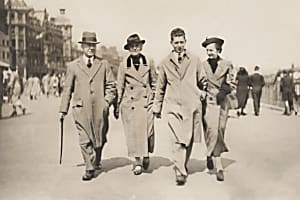SC gives gay community hope, agrees to review Section 377 ruling
Dhananjay Mahapatra | TNN | Updated: Jan 9, 2018, 03:06 ISTHighlights
- The apex court indicated that it is time for a relook at the ruling.
- The SC said that the definition of the order of nature is not static and subject to change.
- SC’s endeavour is to set the stage for a constitutional scrutiny to delineate distinction between public perceptions of morality and constitutional rights.

NEW DELHI: The Supreme Court on Monday opened a door of hope for members of the lesbian, gay, bisexual, transgender and queer (LGBTQ) community by setting the stage for reconsideration of its much-criticised December 2013 verdict upholding criminalisation of consensual gay sex.
The SC's 2013 ruling had dealt a big blow to the LGBTQ community by overturning a 2009 judgment of the Delhi high court, which had decriminalised Section 377 of IPC to legally permit consensual sexual relationships in private between adults of the same gender.
A bench of CJI Dipak Misra and Justices A M Khanwilkar and D Y Chandrachud indicated that it is time for a relook+ at the ruling. "A section of people or individuals who exercise their choice should never remain in a state of fear."
The Supreme Court said that the definition of the order of nature, the basis of criminalisation of same-sex relationships, is not static and subject to change. Section 377 deals with "unnatural offences" and stipulates "whoever voluntarily has carnal intercourse against the order of nature of any man, woman or animal shall be punished with imprisonment for life, or with imprisonment of either description for a term which may extend to ten years, and shall also be liable to fine".

Referring the important issue, which often evokes strong social and political sentiments, to a Constitution bench, the CJI-led bench said: "Section 377 uses a phraseology 'carnal intercourse against the order of nature'. The determination of 'order of nature' is not a constant phenomenon. Societal morality also changes from age to age. The law copes with life and accordingly change takes place. The morality that public perceives, the Constitution may not conceive of."
This indicated the SC's endeavour to set the stage for a constitutional scrutiny to delineate the distinction between public perceptions of morality and constitutional rights and morality. The comments came as the bench sought the Centre's response to a writ petition jointly filed by five noted personalities who overcame social inhibitions to declare their sexual preferences as being part of the LGBTQ community and sought protection of their rights under right to privacy and choice. The bench dropped loud hints that the SC has travelled a long way since the 2013 verdict that had pushed the gay community, liberated by the Delhi HC order, back into the zone of fear of police harassment under the 158-year-old IPC provision that made expression of their sexual preferences an offence.
Recognising constitutional protection to an individual's right and privacy, as articulated by Justice Chandrachud and agreed to by Justice S K Kaul in a landmark order holding privacy to be a fundamental right, SC said: "The individual autonomy and also individual orientation cannot be atrophied unless the restriction is regarded as reasonable to yield to the morality of the Constitution." The privacy verdict identified sexual orientation as one of the attributes of privacy, which formed part of right to life.
"What is natural to one may not be natural to other but the said natural orientation and choice cannot be allowed to cross the boundaries of law and as the confines of law cannot tamper or curtail the inherent right embedded in an individual under Article 21 (including right to privacy) of the Constitution," it said.

The bench said when it said that individuals should never be in fear for expressing their choice, it did not mean there should not be fear of law because 'fear of law builds civilised society'. "But that law must have the acceptability of the constitutional parameters. That is the litmus test," the bench said and indicated that it would be difficult not to decriminalise Section 377 given the constitutional protection to the right of privacy, of which sexual orientation has been held to be intrinsic. However, the court emphasised that there will be no protection to paedophiles, who sexually exploit children. It also said it would not even consider decriminalisation of carnal intercourse with animals.
"Taking all the aspects in a cumulative manner, we are of the view, the decision in Suresh Kumar Kaushal's case requires reconsideration. As the question relates to constitutional issues, we think it appropriate to refer the matter to a larger bench," the three-judge bench said.
TOI had reported on June 28, 2016 about the filing of this petition by dancer N S Johar, journalist Sunil Mehra, chef Ritu Dalmia, hotelier Aman Nath and business executive Ayesha Kapur. The petitioners said their lives have been "inexorably constricted and their rights infringed" by Section 377.
"Despite their achievements and contributions to India in various fields, they are being denied the right to sexuality, the most basic and inherent of fundamental rights. Section 377 renders them criminals in their own country," the petition said.
The SC's 2013 ruling had dealt a big blow to the LGBTQ community by overturning a 2009 judgment of the Delhi high court, which had decriminalised Section 377 of IPC to legally permit consensual sexual relationships in private between adults of the same gender.
A bench of CJI Dipak Misra and Justices A M Khanwilkar and D Y Chandrachud indicated that it is time for a relook+ at the ruling. "A section of people or individuals who exercise their choice should never remain in a state of fear."
The Supreme Court said that the definition of the order of nature, the basis of criminalisation of same-sex relationships, is not static and subject to change. Section 377 deals with "unnatural offences" and stipulates "whoever voluntarily has carnal intercourse against the order of nature of any man, woman or animal shall be punished with imprisonment for life, or with imprisonment of either description for a term which may extend to ten years, and shall also be liable to fine".

Referring the important issue, which often evokes strong social and political sentiments, to a Constitution bench, the CJI-led bench said: "Section 377 uses a phraseology 'carnal intercourse against the order of nature'. The determination of 'order of nature' is not a constant phenomenon. Societal morality also changes from age to age. The law copes with life and accordingly change takes place. The morality that public perceives, the Constitution may not conceive of."
This indicated the SC's endeavour to set the stage for a constitutional scrutiny to delineate the distinction between public perceptions of morality and constitutional rights and morality. The comments came as the bench sought the Centre's response to a writ petition jointly filed by five noted personalities who overcame social inhibitions to declare their sexual preferences as being part of the LGBTQ community and sought protection of their rights under right to privacy and choice. The bench dropped loud hints that the SC has travelled a long way since the 2013 verdict that had pushed the gay community, liberated by the Delhi HC order, back into the zone of fear of police harassment under the 158-year-old IPC provision that made expression of their sexual preferences an offence.
Recognising constitutional protection to an individual's right and privacy, as articulated by Justice Chandrachud and agreed to by Justice S K Kaul in a landmark order holding privacy to be a fundamental right, SC said: "The individual autonomy and also individual orientation cannot be atrophied unless the restriction is regarded as reasonable to yield to the morality of the Constitution." The privacy verdict identified sexual orientation as one of the attributes of privacy, which formed part of right to life.
"What is natural to one may not be natural to other but the said natural orientation and choice cannot be allowed to cross the boundaries of law and as the confines of law cannot tamper or curtail the inherent right embedded in an individual under Article 21 (including right to privacy) of the Constitution," it said.

The bench said when it said that individuals should never be in fear for expressing their choice, it did not mean there should not be fear of law because 'fear of law builds civilised society'. "But that law must have the acceptability of the constitutional parameters. That is the litmus test," the bench said and indicated that it would be difficult not to decriminalise Section 377 given the constitutional protection to the right of privacy, of which sexual orientation has been held to be intrinsic. However, the court emphasised that there will be no protection to paedophiles, who sexually exploit children. It also said it would not even consider decriminalisation of carnal intercourse with animals.
"Taking all the aspects in a cumulative manner, we are of the view, the decision in Suresh Kumar Kaushal's case requires reconsideration. As the question relates to constitutional issues, we think it appropriate to refer the matter to a larger bench," the three-judge bench said.
TOI had reported on June 28, 2016 about the filing of this petition by dancer N S Johar, journalist Sunil Mehra, chef Ritu Dalmia, hotelier Aman Nath and business executive Ayesha Kapur. The petitioners said their lives have been "inexorably constricted and their rights infringed" by Section 377.
"Despite their achievements and contributions to India in various fields, they are being denied the right to sexuality, the most basic and inherent of fundamental rights. Section 377 renders them criminals in their own country," the petition said.
Get latest news & live updates on the go on your pc with News App. Download The Times of India news app for your device.
From around the web
More from The Times of India
From the Web
More From The Times of India

Coffee Lover? Try These 3 Cheap K-Cup Alternatives Today
CoffeeBeans | Angelino's
An Outrageous Card Offering 0% Interest Until 2019
NextAdvisor
The Highest Paying Cash Back Card Has Just Hit The Market
Credit.com
Want Better Appetite Control? Do This Once Daily (Easy But..
Gundry MD
Free Real Estate Event in the San Francisco Area January 1..
Fortune Builders











































All Comments ()+^ Back to Top
Refrain from posting comments that are obscene, defamatory or inflammatory, and do not indulge in personal attacks, name calling or inciting hatred against any community. Help us delete comments that do not follow these guidelines by marking them offensive. Let's work together to keep the conversation civil.
HIDE